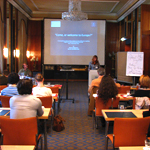“Come, Or Welcome To Europe?” A Comparative Analysis Of The Inside-out Views Of Russian-Speaking Migrants In Selected European Countries
-
-

-
Presentation speakers
- Ekaterina Bagreeva, Russian Economic University of G. V. Plekhanov
- Download presentation
Abstract:
After the dissolution of the Soviet Union, many Russian-speaking migrants found it attractive to move to European countries such as Germany and Norway as a result of different push- and pull-factors, expecting to find a friendly environment and a new home. Most of the migrants to Germany hoped to experience Europe as an inclusive environment on the basis of having a common ethnic background, and expecting a feeling of returning home. Since the majority of migrants to Norway moved due to family reunion, they hoped to find an understanding in their new home, as well as relying on years of long-lasting relationship/friendship and common borders between the countries as a guarantee for an easy inclusion. The question is: How are the Russian-speaking migrants perceived by the representatives of these European countries and how do the migrants perceive the native population? Do they just come to Europe, or are they really feeling themselves welcome? Do they perceive themselves to be equal with the local population in a sense of being “new” Europeans? Furthermore, do the migration politics of these European countries make the migrants feel welcome? Are their expectations for help met by the host country? What do the migrants perceive as negative and positive sides of the integration policies of these European countries? How are they accepting the mentality, peculiarities and national character of the host country? To answer these and other questions a pilot research was performed in 2008-2010 which included quantitative investigations with 190 respondents in Germany and 62 in Norway, as well as qualitative in-depth interviews in both countries. -
Related Presentations






















